International Strategy Assignment: Toyota's Strategy Analysis Report
VerifiedAdded on 2022/09/14
|6
|971
|18
Report
AI Summary
This report provides an analysis of Toyota's international strategy, examining its successful adaptation to various national environments, including Indonesia, Taiwan, North America, and Europe. It highlights Toyota's use of leveling fluctuations, global and regional models, innovation, and teamwork. The report also discusses Toyota's approach to brand recall, marketing strategies, and cost-leadership market structure, and identifies areas for improvement. Furthermore, it explores the importance of effective inventory control, supplier relationship management, and streamlined supply chain management for a successful career in supply chain operations. The report emphasizes the significance of ethical considerations, environmental responsibility, and stakeholder management in Toyota's international business operations.
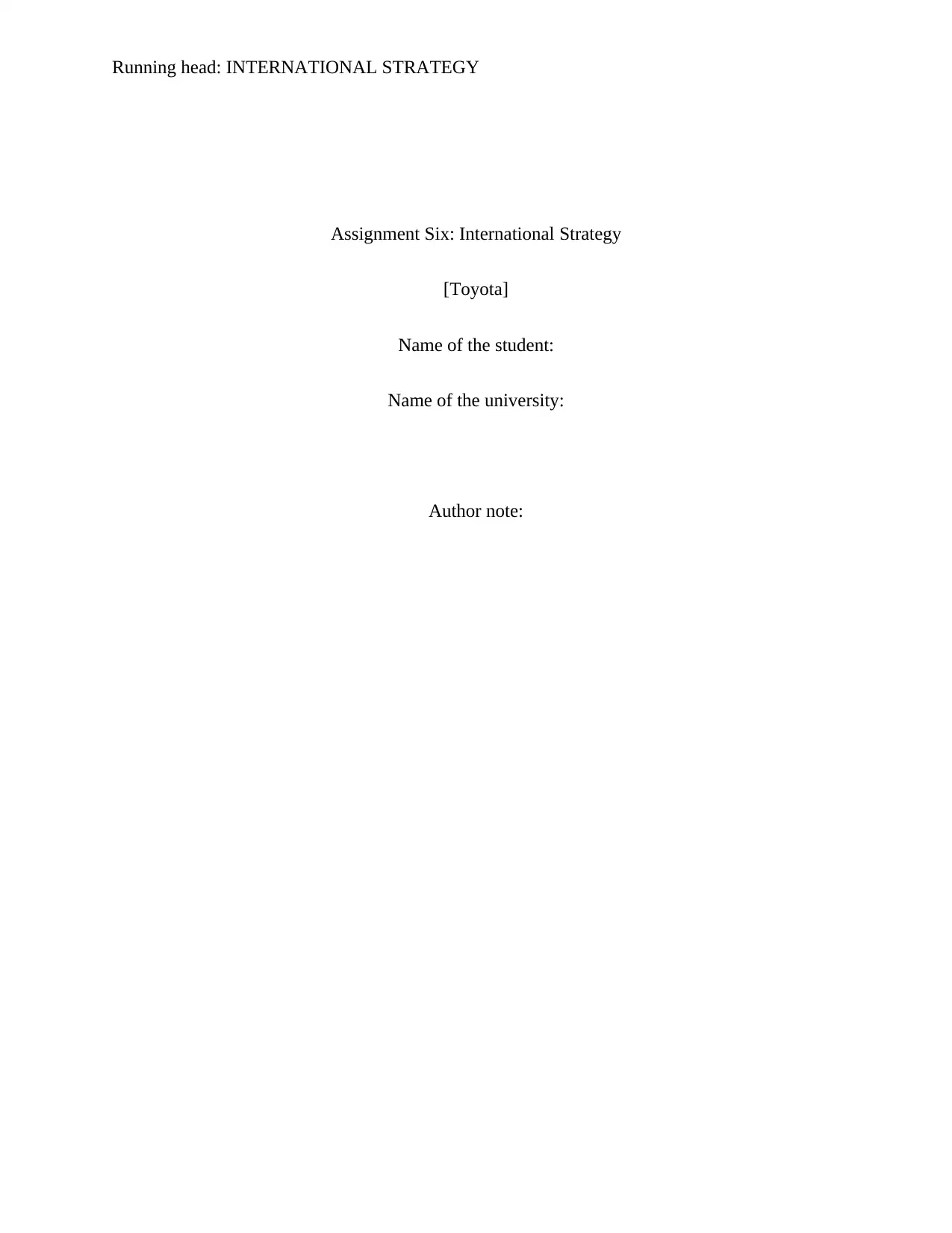
Running head: INTERNATIONAL STRATEGY
Assignment Six: International Strategy
[Toyota]
Name of the student:
Name of the university:
Author note:
Assignment Six: International Strategy
[Toyota]
Name of the student:
Name of the university:
Author note:
Paraphrase This Document
Need a fresh take? Get an instant paraphrase of this document with our AI Paraphraser
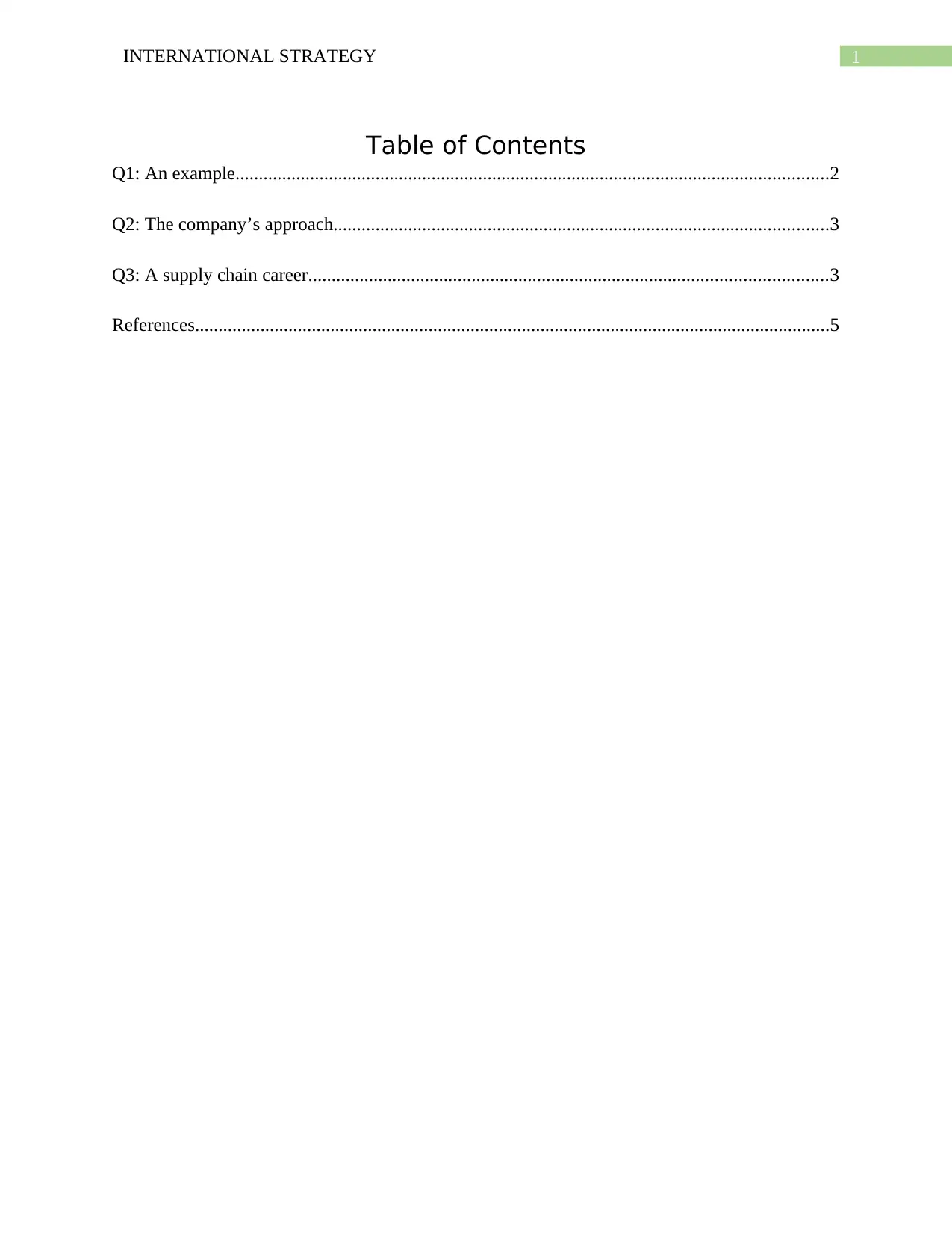
1INTERNATIONAL STRATEGY
Table of Contents
Q1: An example...............................................................................................................................2
Q2: The company’s approach..........................................................................................................3
Q3: A supply chain career...............................................................................................................3
References........................................................................................................................................5
Table of Contents
Q1: An example...............................................................................................................................2
Q2: The company’s approach..........................................................................................................3
Q3: A supply chain career...............................................................................................................3
References........................................................................................................................................5
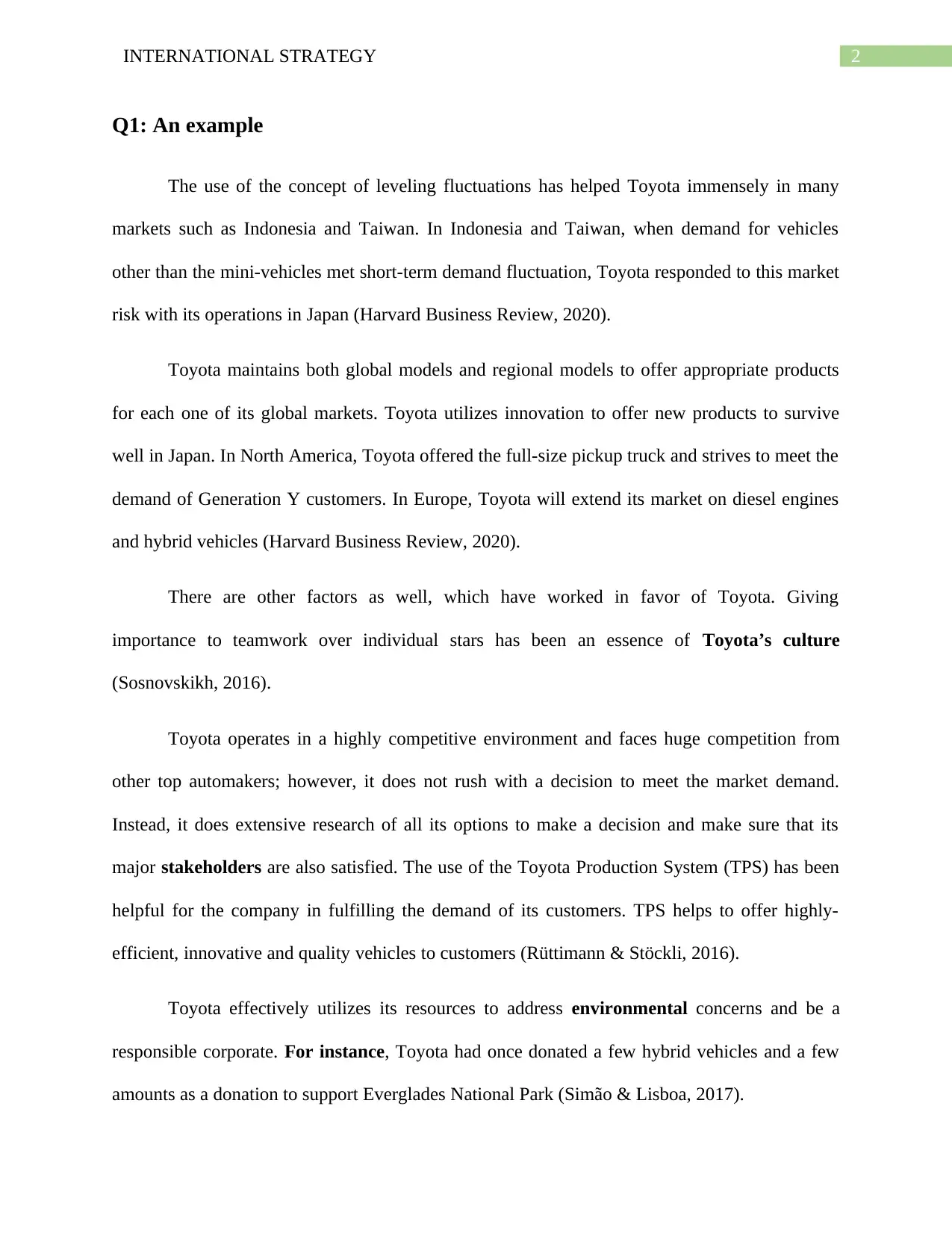
2INTERNATIONAL STRATEGY
Q1: An example
The use of the concept of leveling fluctuations has helped Toyota immensely in many
markets such as Indonesia and Taiwan. In Indonesia and Taiwan, when demand for vehicles
other than the mini-vehicles met short-term demand fluctuation, Toyota responded to this market
risk with its operations in Japan (Harvard Business Review, 2020).
Toyota maintains both global models and regional models to offer appropriate products
for each one of its global markets. Toyota utilizes innovation to offer new products to survive
well in Japan. In North America, Toyota offered the full-size pickup truck and strives to meet the
demand of Generation Y customers. In Europe, Toyota will extend its market on diesel engines
and hybrid vehicles (Harvard Business Review, 2020).
There are other factors as well, which have worked in favor of Toyota. Giving
importance to teamwork over individual stars has been an essence of Toyota’s culture
(Sosnovskikh, 2016).
Toyota operates in a highly competitive environment and faces huge competition from
other top automakers; however, it does not rush with a decision to meet the market demand.
Instead, it does extensive research of all its options to make a decision and make sure that its
major stakeholders are also satisfied. The use of the Toyota Production System (TPS) has been
helpful for the company in fulfilling the demand of its customers. TPS helps to offer highly-
efficient, innovative and quality vehicles to customers (Rüttimann & Stöckli, 2016).
Toyota effectively utilizes its resources to address environmental concerns and be a
responsible corporate. For instance, Toyota had once donated a few hybrid vehicles and a few
amounts as a donation to support Everglades National Park (Simão & Lisboa, 2017).
Q1: An example
The use of the concept of leveling fluctuations has helped Toyota immensely in many
markets such as Indonesia and Taiwan. In Indonesia and Taiwan, when demand for vehicles
other than the mini-vehicles met short-term demand fluctuation, Toyota responded to this market
risk with its operations in Japan (Harvard Business Review, 2020).
Toyota maintains both global models and regional models to offer appropriate products
for each one of its global markets. Toyota utilizes innovation to offer new products to survive
well in Japan. In North America, Toyota offered the full-size pickup truck and strives to meet the
demand of Generation Y customers. In Europe, Toyota will extend its market on diesel engines
and hybrid vehicles (Harvard Business Review, 2020).
There are other factors as well, which have worked in favor of Toyota. Giving
importance to teamwork over individual stars has been an essence of Toyota’s culture
(Sosnovskikh, 2016).
Toyota operates in a highly competitive environment and faces huge competition from
other top automakers; however, it does not rush with a decision to meet the market demand.
Instead, it does extensive research of all its options to make a decision and make sure that its
major stakeholders are also satisfied. The use of the Toyota Production System (TPS) has been
helpful for the company in fulfilling the demand of its customers. TPS helps to offer highly-
efficient, innovative and quality vehicles to customers (Rüttimann & Stöckli, 2016).
Toyota effectively utilizes its resources to address environmental concerns and be a
responsible corporate. For instance, Toyota had once donated a few hybrid vehicles and a few
amounts as a donation to support Everglades National Park (Simão & Lisboa, 2017).
⊘ This is a preview!⊘
Do you want full access?
Subscribe today to unlock all pages.

Trusted by 1+ million students worldwide
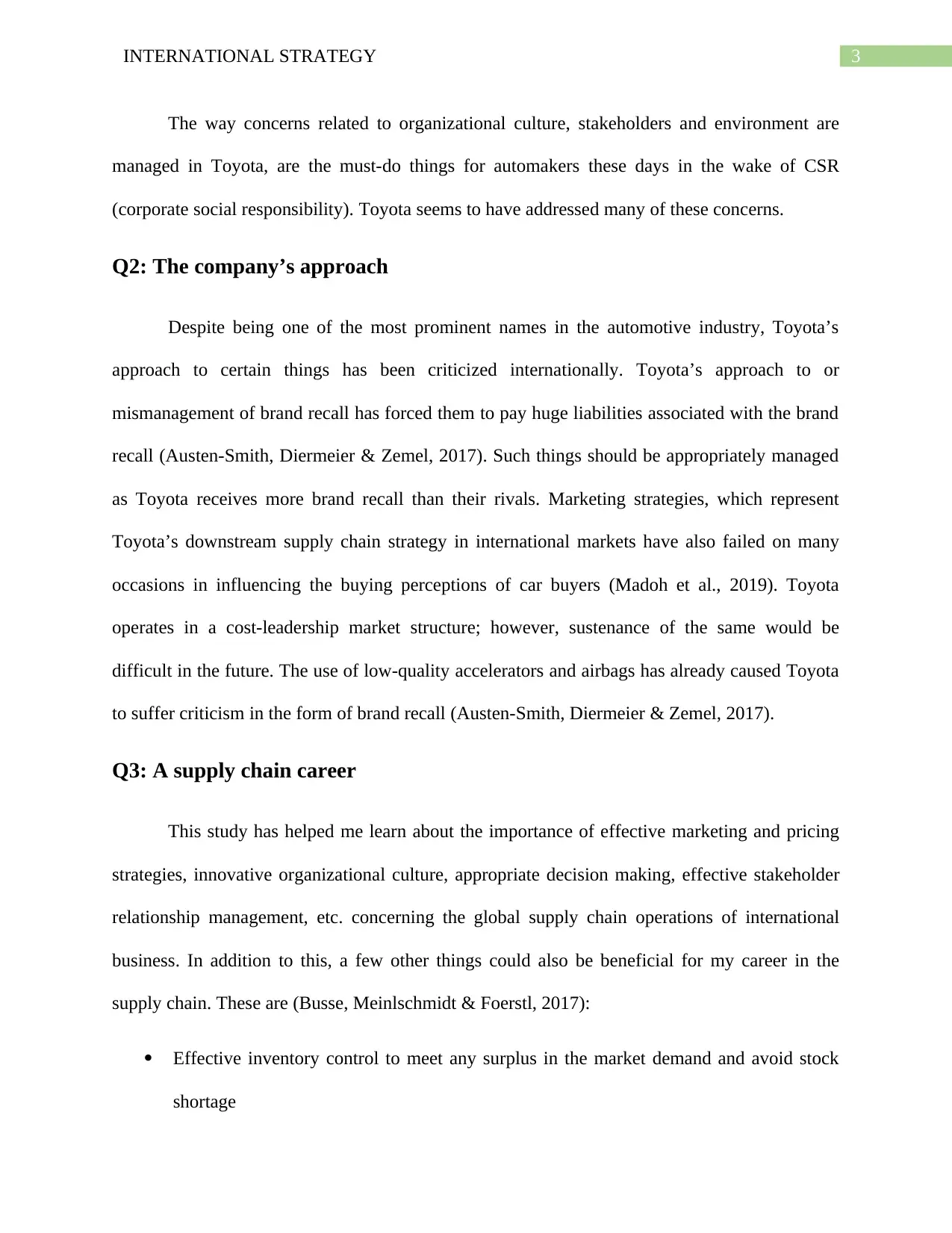
3INTERNATIONAL STRATEGY
The way concerns related to organizational culture, stakeholders and environment are
managed in Toyota, are the must-do things for automakers these days in the wake of CSR
(corporate social responsibility). Toyota seems to have addressed many of these concerns.
Q2: The company’s approach
Despite being one of the most prominent names in the automotive industry, Toyota’s
approach to certain things has been criticized internationally. Toyota’s approach to or
mismanagement of brand recall has forced them to pay huge liabilities associated with the brand
recall (Austen-Smith, Diermeier & Zemel, 2017). Such things should be appropriately managed
as Toyota receives more brand recall than their rivals. Marketing strategies, which represent
Toyota’s downstream supply chain strategy in international markets have also failed on many
occasions in influencing the buying perceptions of car buyers (Madoh et al., 2019). Toyota
operates in a cost-leadership market structure; however, sustenance of the same would be
difficult in the future. The use of low-quality accelerators and airbags has already caused Toyota
to suffer criticism in the form of brand recall (Austen-Smith, Diermeier & Zemel, 2017).
Q3: A supply chain career
This study has helped me learn about the importance of effective marketing and pricing
strategies, innovative organizational culture, appropriate decision making, effective stakeholder
relationship management, etc. concerning the global supply chain operations of international
business. In addition to this, a few other things could also be beneficial for my career in the
supply chain. These are (Busse, Meinlschmidt & Foerstl, 2017):
Effective inventory control to meet any surplus in the market demand and avoid stock
shortage
The way concerns related to organizational culture, stakeholders and environment are
managed in Toyota, are the must-do things for automakers these days in the wake of CSR
(corporate social responsibility). Toyota seems to have addressed many of these concerns.
Q2: The company’s approach
Despite being one of the most prominent names in the automotive industry, Toyota’s
approach to certain things has been criticized internationally. Toyota’s approach to or
mismanagement of brand recall has forced them to pay huge liabilities associated with the brand
recall (Austen-Smith, Diermeier & Zemel, 2017). Such things should be appropriately managed
as Toyota receives more brand recall than their rivals. Marketing strategies, which represent
Toyota’s downstream supply chain strategy in international markets have also failed on many
occasions in influencing the buying perceptions of car buyers (Madoh et al., 2019). Toyota
operates in a cost-leadership market structure; however, sustenance of the same would be
difficult in the future. The use of low-quality accelerators and airbags has already caused Toyota
to suffer criticism in the form of brand recall (Austen-Smith, Diermeier & Zemel, 2017).
Q3: A supply chain career
This study has helped me learn about the importance of effective marketing and pricing
strategies, innovative organizational culture, appropriate decision making, effective stakeholder
relationship management, etc. concerning the global supply chain operations of international
business. In addition to this, a few other things could also be beneficial for my career in the
supply chain. These are (Busse, Meinlschmidt & Foerstl, 2017):
Effective inventory control to meet any surplus in the market demand and avoid stock
shortage
Paraphrase This Document
Need a fresh take? Get an instant paraphrase of this document with our AI Paraphraser
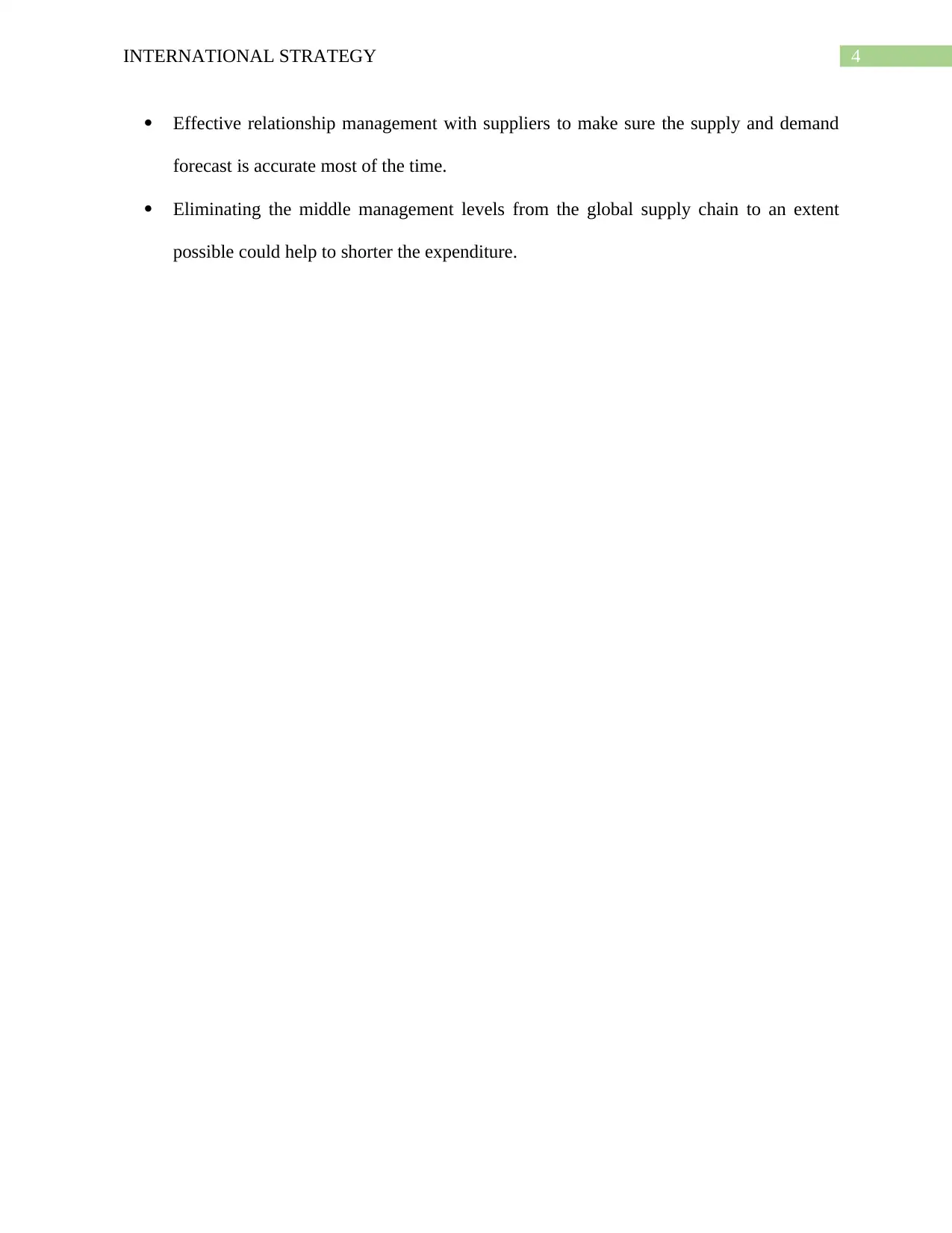
4INTERNATIONAL STRATEGY
Effective relationship management with suppliers to make sure the supply and demand
forecast is accurate most of the time.
Eliminating the middle management levels from the global supply chain to an extent
possible could help to shorter the expenditure.
Effective relationship management with suppliers to make sure the supply and demand
forecast is accurate most of the time.
Eliminating the middle management levels from the global supply chain to an extent
possible could help to shorter the expenditure.
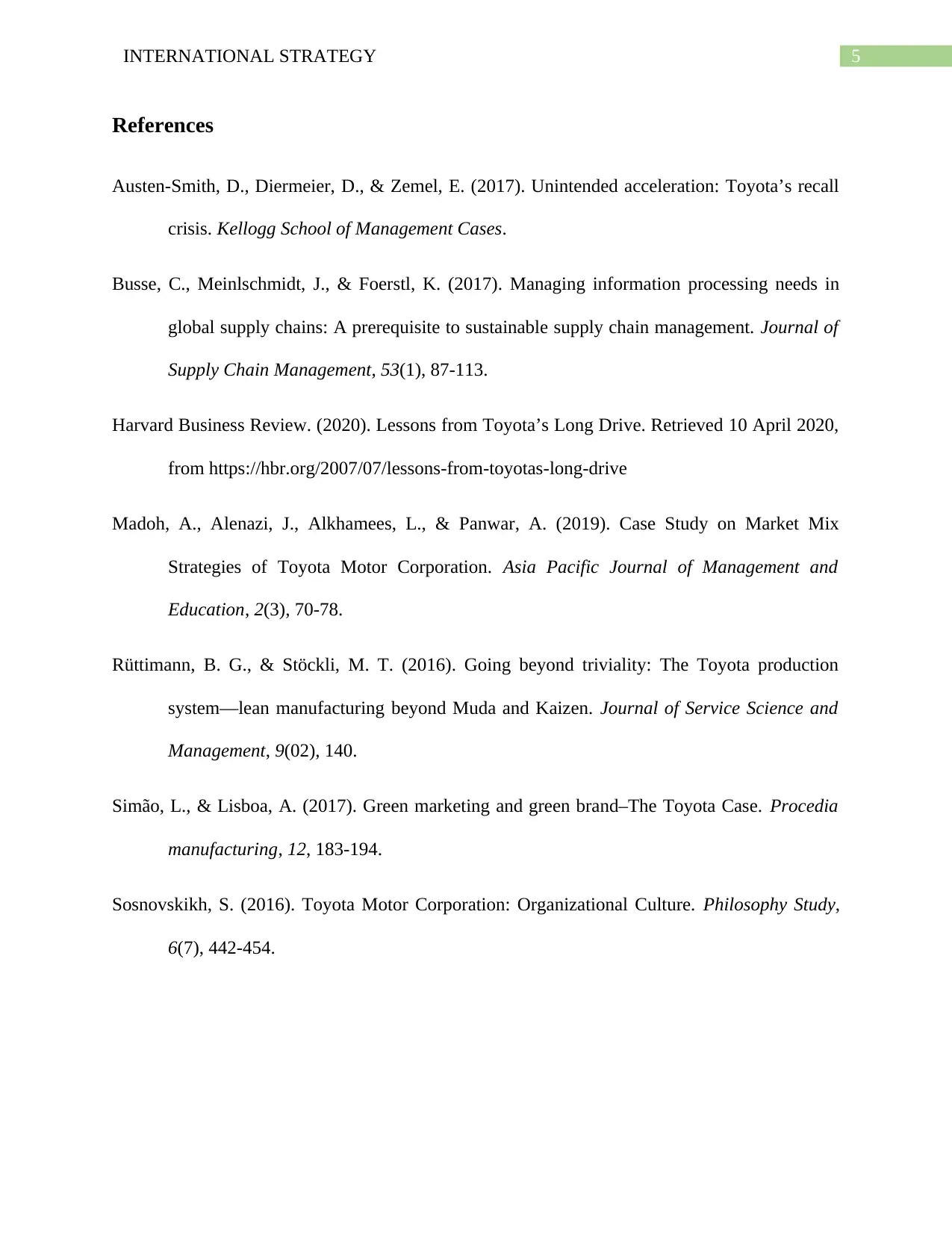
5INTERNATIONAL STRATEGY
References
Austen-Smith, D., Diermeier, D., & Zemel, E. (2017). Unintended acceleration: Toyota’s recall
crisis. Kellogg School of Management Cases.
Busse, C., Meinlschmidt, J., & Foerstl, K. (2017). Managing information processing needs in
global supply chains: A prerequisite to sustainable supply chain management. Journal of
Supply Chain Management, 53(1), 87-113.
Harvard Business Review. (2020). Lessons from Toyota’s Long Drive. Retrieved 10 April 2020,
from https://hbr.org/2007/07/lessons-from-toyotas-long-drive
Madoh, A., Alenazi, J., Alkhamees, L., & Panwar, A. (2019). Case Study on Market Mix
Strategies of Toyota Motor Corporation. Asia Pacific Journal of Management and
Education, 2(3), 70-78.
Rüttimann, B. G., & Stöckli, M. T. (2016). Going beyond triviality: The Toyota production
system—lean manufacturing beyond Muda and Kaizen. Journal of Service Science and
Management, 9(02), 140.
Simão, L., & Lisboa, A. (2017). Green marketing and green brand–The Toyota Case. Procedia
manufacturing, 12, 183-194.
Sosnovskikh, S. (2016). Toyota Motor Corporation: Organizational Culture. Philosophy Study,
6(7), 442-454.
References
Austen-Smith, D., Diermeier, D., & Zemel, E. (2017). Unintended acceleration: Toyota’s recall
crisis. Kellogg School of Management Cases.
Busse, C., Meinlschmidt, J., & Foerstl, K. (2017). Managing information processing needs in
global supply chains: A prerequisite to sustainable supply chain management. Journal of
Supply Chain Management, 53(1), 87-113.
Harvard Business Review. (2020). Lessons from Toyota’s Long Drive. Retrieved 10 April 2020,
from https://hbr.org/2007/07/lessons-from-toyotas-long-drive
Madoh, A., Alenazi, J., Alkhamees, L., & Panwar, A. (2019). Case Study on Market Mix
Strategies of Toyota Motor Corporation. Asia Pacific Journal of Management and
Education, 2(3), 70-78.
Rüttimann, B. G., & Stöckli, M. T. (2016). Going beyond triviality: The Toyota production
system—lean manufacturing beyond Muda and Kaizen. Journal of Service Science and
Management, 9(02), 140.
Simão, L., & Lisboa, A. (2017). Green marketing and green brand–The Toyota Case. Procedia
manufacturing, 12, 183-194.
Sosnovskikh, S. (2016). Toyota Motor Corporation: Organizational Culture. Philosophy Study,
6(7), 442-454.
⊘ This is a preview!⊘
Do you want full access?
Subscribe today to unlock all pages.

Trusted by 1+ million students worldwide
1 out of 6
Your All-in-One AI-Powered Toolkit for Academic Success.
+13062052269
info@desklib.com
Available 24*7 on WhatsApp / Email
![[object Object]](/_next/static/media/star-bottom.7253800d.svg)
Unlock your academic potential
Copyright © 2020–2026 A2Z Services. All Rights Reserved. Developed and managed by ZUCOL.
